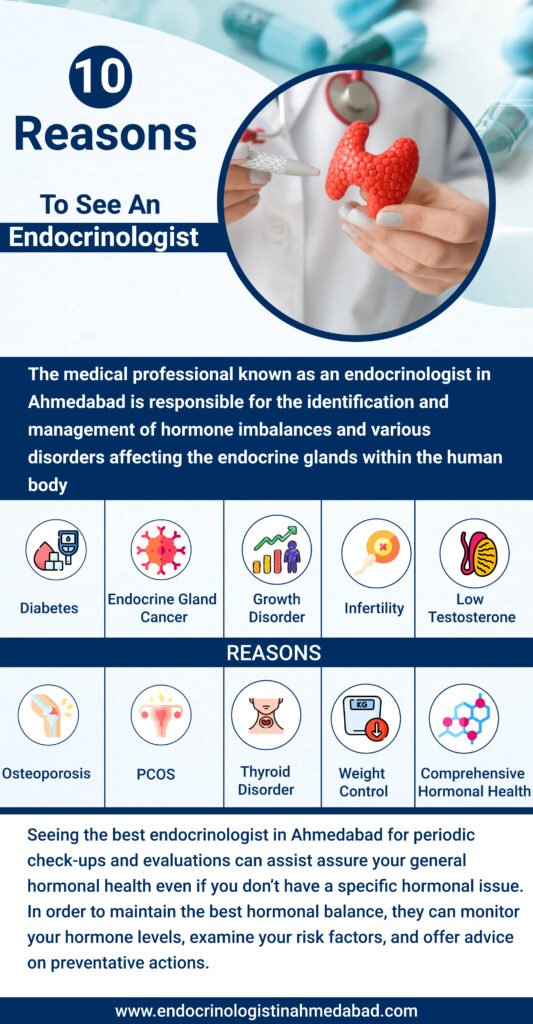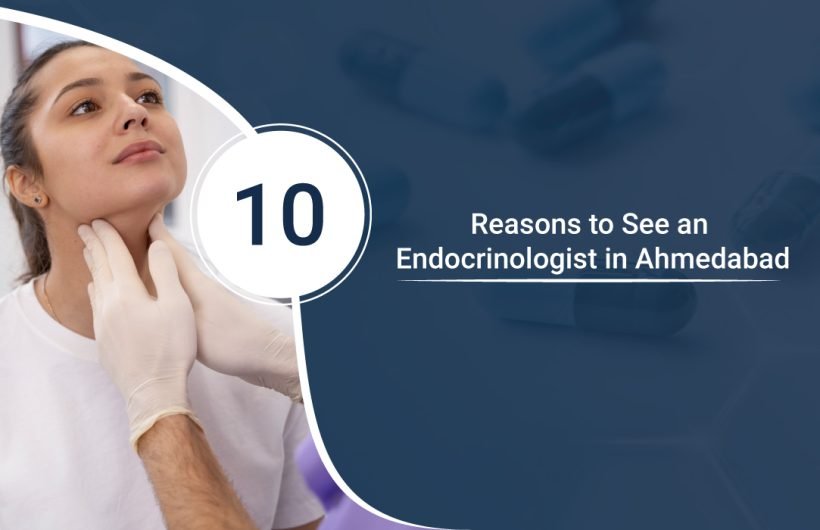The medical professional known as an endocrinologist in Ahmedabad is responsible for the identification and management of hormone imbalances and various disorders affecting the endocrine glands within the human body. The endocrine glands encompass various anatomical structures, namely the thyroid, parathyroid, pancreas, ovaries or testicles, hypothalamus, pituitary, and adrenal glands. Endocrine disorders exhibit a high degree of complexity due to their propensity to impact multiple physiological systems within the body. The majority of individuals seek the services of an endocrinologist upon receiving a referral from their primary care physician for the purpose of assessment or intervention. If there is a suspicion of an endocrine disorder, it may be necessary to consult with an endocrine specialist, also known as an endocrinologist.

Diabetes
Diabetes is a chronic metabolic disorder characterized by high blood glucose levels resulting from defects in insulin secretion, and insulin action. Diabetes is the prevailing endocrine disorder in the United States. In individuals with diabetes, there is insufficient production of insulin by the pancreas, a hormone responsible for facilitating the utilization of glucose by the body’s cells for energy. Consequently, glucose remains within the bloodstream rather than fulfilling its intended role of aiding cellular function. Symptoms such as heightened thirst and urination, fatigue, and impaired visual acuity serve as indicative manifestations of diabetes.
It is imperative for individuals affected by diabetes, encompassing type 1 diabetes, type 2 diabetes, and gestational diabetes, to engage in regular monitoring of their blood glucose levels sometimes you need a diabetes doctor for these tests in different cities like a diabetes doctor in Ahmedabad, Pune or anywhere else. Those Individuals diagnosed with Type 1 diabetes are required to administer insulin as their endogenous production of this hormone is insufficient. The treatment regimen for type 2 diabetes encompasses various interventions, such as implementing modifications to one’s lifestyle and dietary habits, engaging in weight reduction efforts, and incorporating the administration of oral medications, potentially supplemented with insulin therapy.
Endocrine Gland Cancer
Endocrine gland malignancies encompass various types of cancers, such as thyroid cancer, parathyroid cancer, adrenal cancer, pituitary cancer, and other infrequent malignancies. These malignancies have the potential to disrupt hormone equilibrium. Individuals diagnosed with endocrine cancer often collaborate with both an oncologist and an endocrinologist in order to effectively address and control their condition. The manifestation of symptoms and the approach to treatment are contingent upon the particular classification of cancer.
The management of endocrine cancer may involve the involvement of an endocrinologist who specializes in the regulation of hormone levels and there is one of the best endocrinologists Specialist in Ahmedabad you should consider it without delaying medical difficulties. Typically, this process entails the reduction of excessively elevated hormone levels. Nevertheless, an alternative approach involves the utilization of hormones in an attempt to impede the proliferation of the tumor. In certain instances, the administration of hormone replacement therapy becomes imperative subsequent to the surgical removal of a malignant gland.
Growth Disorder
Growth disorders encompass a range of conditions such as acromegaly, gigantism, growth hormone deficiency, short stature, early puberty, delayed puberty, Klinefelter syndrome, Turner’s syndrome, and various genetic disorders. Certain disorders can result in abnormal or accelerated growth. Some individuals experience delayed or incomplete growth, as well as learning disabilities and developmental delays.
Abnormal growth in certain disorders can be attributed to the influence of sex hormones. In other cases, growth hormone is considered to be the causative factor. The regulation of hormones has the potential to rectify growth abnormalities and mitigate prospective complications. Due to the infrequent occurrence of growth disorders, it is imperative to collaborate with a proficient endocrinologist.
Infertility
Infertility is a medical condition characterized by the inability to conceive a child or carry a pregnancy to full term.
Individuals experiencing infertility seek the expertise of a specialized medical professional known as a reproductive endocrinologist. The endocrinologist possesses the requisite expertise to accurately identify the underlying factors contributing to infertility and provide appropriate therapeutic interventions.
Infertility can arise from factors pertaining to the female reproductive system, the male reproductive system, or a combination thereof. The choice of treatment is contingent upon the underlying cause, with hormone medications being frequently employed. Hormonal interventions have the capacity to induce ovulation and prime the uterine environment in women undergoing artificial insemination and assisted reproduction technologies (ART). Illustrations of ART encompass the utilization of IVF (in vitro fertilization) and ICSI (intracytoplasmic sperm injection).
Low Testosterone
Hypogonadism, also known as low testosterone or low T, is a medical condition. Determining the precise prevalence of low testosterone (T) in men poses challenges due to variations in definitions and populations across studies investigating this condition. According to expert estimations, a substantial number of American males are affected by this condition, particularly among the older demographic. Symptoms associated with low testosterone levels encompass diminished sexual desire, testicular atrophy, and alopecia. It is plausible that males may experience diminished energy levels, depressive symptoms, muscular debility, and disturbances in sleep patterns.
Testosterone therapy is a viable treatment option for individuals with low levels of testosterone, as confirmed by laboratory tests indicating a hormonal deficiency.
Osteoporosis
Osteoporosis is a medical condition characterized by a decrease in bone density, resulting in brittle and fragile bones
Osteoporosis refers to the progressive reduction in bone density and loss of bone mass. The prevalence of osteoporosis in individuals of both genders escalates with advancing age due to the gradual decline in sex hormone levels. Nevertheless, elevated concentrations of thyroid hormone, parathyroid hormone, and cortisol can also contribute to the development of osteoporosis. These endocrine disorders perturb the physiological equilibrium of bone turnover and remodeling.
The primary therapeutic approach involves the administration of medication aimed at enhancing bone density and mitigating bone resorption. Hormone replacement therapy has been found to be beneficial in certain cases. Nevertheless, there are inherent risks associated with this, such as the development of cancer and the formation of blood clots. The specialized knowledge of an endocrinologist can provide a comprehensive understanding of the available options and offer valuable guidance in making informed decisions regarding treatment. Implementing lifestyle modifications can also contribute to the deceleration or cessation of bone loss, as well as serve as a preventive measure against fractures.
Polycystic Ovary Syndrome (PCOS)
Polycystic Ovary Syndrome (PCOS) is a medical condition characterized by the presence of multiple cysts in the ovaries.
Women diagnosed with Polycystic Ovary Syndrome (PCOS) exhibit elevated levels of androgens, commonly referred to as male hormones, as well as insulin, surpassing the typical range observed in individuals without this condition. Consequently, the primary manifestations of this condition include the presence of enlarged ovaries characterized by numerous small cysts, irregular menstrual cycles, and metabolic disturbances, such as diabetes. Polycystic ovary syndrome (PCOS) can also give rise to complications such as infertility, hirsutism, obesity, and acne.
Similar to other endocrine disorders, the treatment modality for this condition entails the restoration of hormonal equilibrium. Potential treatment options may encompass medications that regulate insulin and androgen levels, hormone-based contraceptives, and weight loss programs under medical supervision. Implementing lifestyle modifications can also contribute to the alleviation of symptoms.
Thyroid Disorder
Thyroid disorders rank as the second most prevalent form of endocrine disorders within the United States. Thyroid hormones play a crucial role in the regulation of an individual’s metabolism, which pertains to the rate at which various physiological processes within the body operate. Excessive levels of thyroid hormone result in the hyperactivation of bodily functions. Insufficient levels of thyroid hormone can result in a decrease in bodily activity and overall sluggishness. Hypothyroidism, characterized by reduced levels of thyroid hormones, is a more prevalent condition compared to hyperthyroidism, which involves elevated levels of thyroid hormones.
Weight Control
Hormonal abnormalities can cause weight gain or make it difficult to lose weight. In order to create a customized weight-management strategy that addresses the underlying reasons for your weight difficulties, an endocrinologist will evaluate your hormone levels, metabolism, and underlying conditions.
Comprehensive Hormonal Health
Seeing the best endocrinologist in Ahmedabad for periodic check-ups and evaluations can assist assure your general hormonal health even if you don’t have a specific hormonal issue. In order to maintain the best hormonal balance, they can monitor your hormone levels, examine your risk factors, and offer advice on preventative actions.
Call To Action
We recommend seeking consultation with Dr. Moxit Shah, a highly regarded Diabetologist in Ahmedabad, for professional guidance and support in managing diabetes. The medical staff strives to create a comfortable environment for patients, ensuring their well-being throughout the treatment process. Dr. Moxit Shah is a renowned diabetologist with expertise in the field. He is dedicated to promoting healthier lifestyles and providing assistance to individuals across multiple countries. Dr. Shah best endocrinologist in Ahmedabad possesses the expertise to provide personalized strategies, comprehensive interpretation of test results, and effective diabetes treatment plans for various types of diabetic persons. With his extensive knowledge and compassionate approach, he is now accessible as the premier diabetologist in Ahmedabad. Please schedule an appointment with Dr. Moxit Shah promptly to initiate progress toward optimal health.






